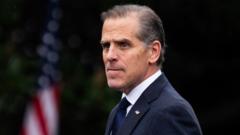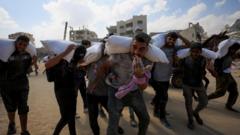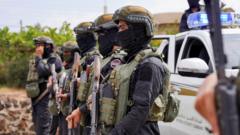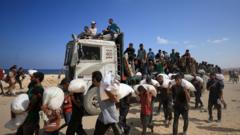The escalation in hostilities between Israel and Hamas has led to profound international condemnation, with allegations of war crimes mounting against both parties. Allies are increasingly losing patience with Israel's actions in Gaza, raising concerns about humanitarian violations.
Growing Evidence of War Crimes in Gaza as Allies Reassess Support for Israel

Growing Evidence of War Crimes in Gaza as Allies Reassess Support for Israel
International scrutiny of both Hamas and Israel intensifies amidst ongoing conflict and accusations of war crimes.
Article Text:
Jeremy Bowen, International Editor
Two years prior, Hamas was meticulously planning its attack on Israel, while Israeli Prime Minister Benjamin Netanyahu viewed the Palestinians as manageable issues, claiming the true adversary was Iran. Despite his unwavering stance against Hamas, Netanyahu allowed funding from Qatar into Gaza, which he hoped would create leeway for addressing his primary foreign policy focus: countering Iranian influence and fostering diplomatic ties with Saudi Arabia. Meanwhile, the Biden administration was optimistic about bridging a historic deal between the Saudis and Israelis.
However, this optimism was illusory. Netanyahu has not initiated an inquiry into the failures that allowed Hamas to inflict significant casualties during their surprise attack on October 7, 2023. The prolonged conflict between Jews and Arabs over the territory between the River Jordan and the Mediterranean is still unresolved, dangerously near another escalation reminiscent of notable historical conflicts in 1948 and 1967. The landscape of the Middle East has shifted dramatically since October 7, placing the Gaza crisis at a critical juncture.
Journalists face significant challenges in covering this war. After the unexpected assault by Hamas, Israel prohibited international journalists from reporting freely within Gaza. Palestinian reporters have bravely reported from inside the Strip, with nearly 200 losing their lives in the pursuit of truth.
Despite the chaos, several key realities are evident: Hamas's October 7 actions resulted in war crimes, claiming approximately 1,200 lives, primarily among Israeli civilians. Additionally, the harrowing kidnapping of 251 hostages, of whom roughly 20 may still be alive, underscores the brutality of the attacks. Conversely, clear evidence indicates that Israel has also engaged in war crimes, including the starvation of Gazan civilians, casualties among non-combatants amidst military operations, and the disproportionate destruction of towns.
Arrest warrants for war crimes have been issued by the International Criminal Court (ICC) against Netanyahu and his former defense minister, who maintain their innocence. Israel dismisses the ICC’s proceedings as part of an antisemitic narrative, labeling the accusations as mere "blood libels." However, Israel's network of support is thinning, with allies expressing weariness of its handling of the Gaza situation. Donald Trump, once a strong supporter, has reportedly grown frustrated over Netanyahu's aggressive military actions, including bombings in Syria.
Western allies, including the UK, EU nations, Canada, Australia, New Zealand, and Japan, have now openly criticized Israel's actions. A joint statement issued on July 21 condemned the dire humanitarian situation and the ineffective aid distribution overseen by the Gaza Humanitarian Foundation (GHF), suggesting it undermines stability and dignity. The statement highlighted that over 800 Palestinians have died while seeking essential aid, deeming Israel's aid embargo as a violation of international humanitarian law.
UK Foreign Secretary David Lammy echoed these sentiments in Parliament but faced pressure from Labour MPs demanding more concrete actions, including formal recognition of a Palestinian state, a position already adopted by many UN members. Discussions between the UK and France on this matter continue, though consensus remains elusive.
As Israel's Knesset prepares for its summer recess, Netanyahu will momentarily evade potential no-confidence motions from nationalist coalition members staunchly opposed to a ceasefire. Their threats continue to deter Netanyahu from pursuing negotiations that could lead to a truce amidst a growing humanitarian crisis. Yet prospects for a ceasefire are emerging, promising a potential respite for Gaza's civilians and hostages.
While a ceasefire may offer a brief glimmer of hope, the deeper issues that have defined this conflict remain unresolved. The war has inflicted unparalleled suffering; thus, seizing the opportunity to shift from violence to diplomacy is crucial. I’ll be contributing to a BBC debate tonight, examining what measures could ultimately bring an end to this persistent conflict.
Jeremy Bowen, International Editor
Two years prior, Hamas was meticulously planning its attack on Israel, while Israeli Prime Minister Benjamin Netanyahu viewed the Palestinians as manageable issues, claiming the true adversary was Iran. Despite his unwavering stance against Hamas, Netanyahu allowed funding from Qatar into Gaza, which he hoped would create leeway for addressing his primary foreign policy focus: countering Iranian influence and fostering diplomatic ties with Saudi Arabia. Meanwhile, the Biden administration was optimistic about bridging a historic deal between the Saudis and Israelis.
However, this optimism was illusory. Netanyahu has not initiated an inquiry into the failures that allowed Hamas to inflict significant casualties during their surprise attack on October 7, 2023. The prolonged conflict between Jews and Arabs over the territory between the River Jordan and the Mediterranean is still unresolved, dangerously near another escalation reminiscent of notable historical conflicts in 1948 and 1967. The landscape of the Middle East has shifted dramatically since October 7, placing the Gaza crisis at a critical juncture.
Journalists face significant challenges in covering this war. After the unexpected assault by Hamas, Israel prohibited international journalists from reporting freely within Gaza. Palestinian reporters have bravely reported from inside the Strip, with nearly 200 losing their lives in the pursuit of truth.
Despite the chaos, several key realities are evident: Hamas's October 7 actions resulted in war crimes, claiming approximately 1,200 lives, primarily among Israeli civilians. Additionally, the harrowing kidnapping of 251 hostages, of whom roughly 20 may still be alive, underscores the brutality of the attacks. Conversely, clear evidence indicates that Israel has also engaged in war crimes, including the starvation of Gazan civilians, casualties among non-combatants amidst military operations, and the disproportionate destruction of towns.
Arrest warrants for war crimes have been issued by the International Criminal Court (ICC) against Netanyahu and his former defense minister, who maintain their innocence. Israel dismisses the ICC’s proceedings as part of an antisemitic narrative, labeling the accusations as mere "blood libels." However, Israel's network of support is thinning, with allies expressing weariness of its handling of the Gaza situation. Donald Trump, once a strong supporter, has reportedly grown frustrated over Netanyahu's aggressive military actions, including bombings in Syria.
Western allies, including the UK, EU nations, Canada, Australia, New Zealand, and Japan, have now openly criticized Israel's actions. A joint statement issued on July 21 condemned the dire humanitarian situation and the ineffective aid distribution overseen by the Gaza Humanitarian Foundation (GHF), suggesting it undermines stability and dignity. The statement highlighted that over 800 Palestinians have died while seeking essential aid, deeming Israel's aid embargo as a violation of international humanitarian law.
UK Foreign Secretary David Lammy echoed these sentiments in Parliament but faced pressure from Labour MPs demanding more concrete actions, including formal recognition of a Palestinian state, a position already adopted by many UN members. Discussions between the UK and France on this matter continue, though consensus remains elusive.
As Israel's Knesset prepares for its summer recess, Netanyahu will momentarily evade potential no-confidence motions from nationalist coalition members staunchly opposed to a ceasefire. Their threats continue to deter Netanyahu from pursuing negotiations that could lead to a truce amidst a growing humanitarian crisis. Yet prospects for a ceasefire are emerging, promising a potential respite for Gaza's civilians and hostages.
While a ceasefire may offer a brief glimmer of hope, the deeper issues that have defined this conflict remain unresolved. The war has inflicted unparalleled suffering; thus, seizing the opportunity to shift from violence to diplomacy is crucial. I’ll be contributing to a BBC debate tonight, examining what measures could ultimately bring an end to this persistent conflict.





















